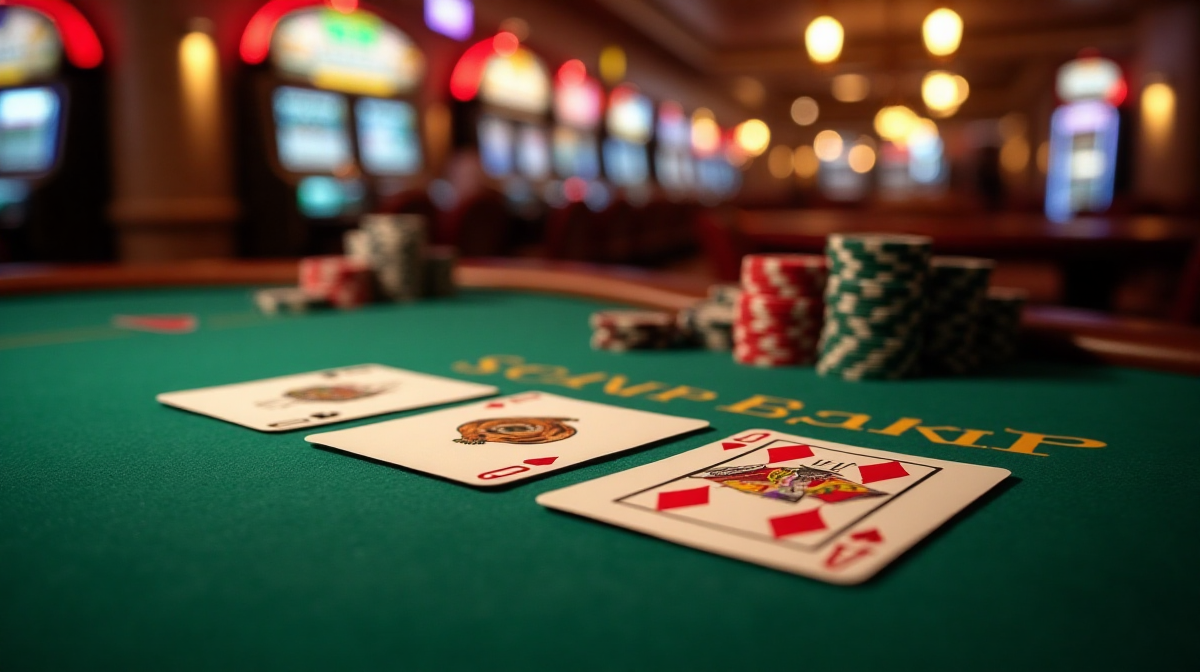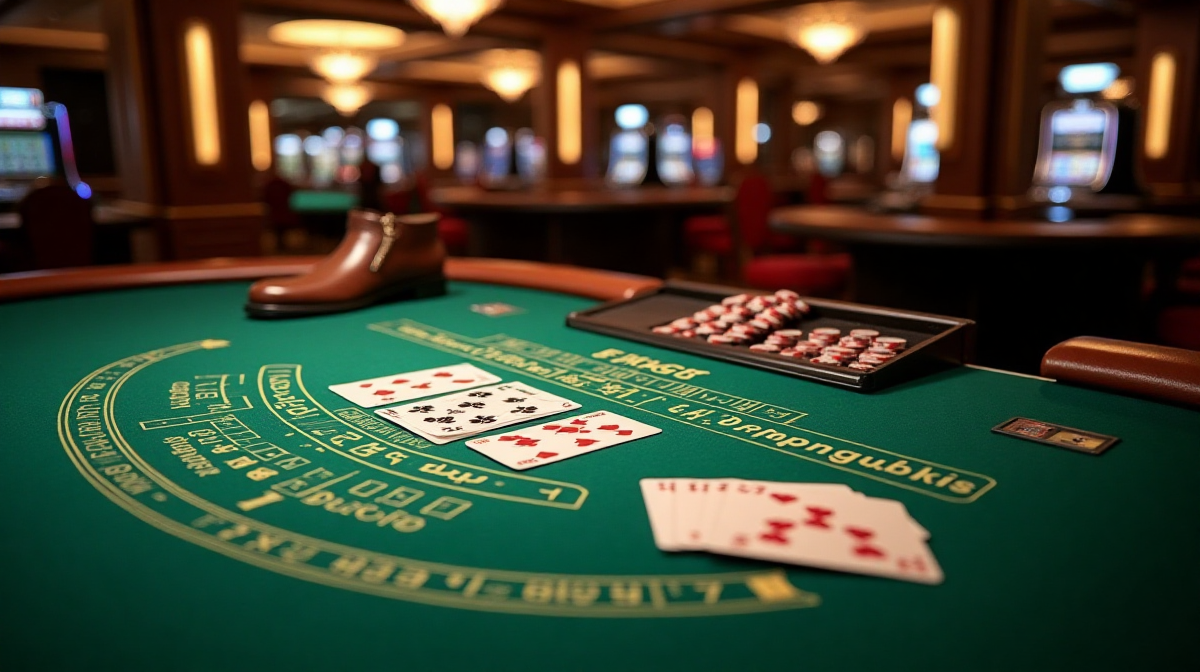Blackjack Dealer Secrets: Win at Casino!
Beyond the Green Felt: What Dealers Actually Know
Blackjack, a cornerstone of casinos worldwide, often feels like a battle of wits between player and house. But what about the person dealing the cards? Blackjack dealers aren't just there to distribute cards; they're highly trained professionals with a deep understanding of the game's rules, probabilities, and even player psychology. They know the basic strategy intimately and are adept at maintaining a consistent pace and managing the table. Understanding their role is the first step towards improving your own game, and perhaps even utilizing platforms like betfuse to analyze potential outcomes.
The Allure of Blackjack - Why it's a Winnable Game
Unlike many casino games with a significant house edge, blackjack, when played with correct strategy, offers players a realistic chance to win. This is because your decisions directly impact the outcome, unlike games of pure chance. The key to success lies in understanding the mathematical probabilities and exploiting the dealer’s inherent limitations. For those seeking insights, exploring resources that offer betfuse prediction tomorrow 1x2 can provide a data-driven starting point, though remember these are predictions, not guarantees.
Dispelling Myths: What Dealers Can't Do
Many players believe dealers have secret ways to influence the game. This isn't true. Dealers adhere to a strict set of rules and cannot deviate from them. They can't change the cards, signal other players, or intentionally manipulate the outcome. However, understanding how they must play, and the rules they must follow, is where the advantage lies for the informed player.
Understanding the Dealer's Role & Rules
Dealer Rules: A Strict Adherence to Protocol
Casino dealers operate under a rigid set of regulations. These rules are designed to ensure fairness and prevent cheating. They must deal cards in a specific manner, follow precise betting procedures, and adhere to the established hit/stand rules. Any deviation from protocol could result in disciplinary action, or even legal consequences.
The Dealer's Hit/Stand Rules – Why 17 is Critical
The dealer's hit/stand rules are arguably the most critical aspect of the game. Typically, a dealer must hit on 16 or less and must stand on 17 or more. This rule, while seemingly simple, creates a vulnerability that skilled players can exploit. This is a foundational element when considering strategies, and even when checking resources like the betfuse app download for potential game analysis tools.
Dealer Procedures: Card Handling, Dealing Techniques, & Table Management
Beyond the rules, dealers employ specific techniques for card handling, dealing, and table management. These techniques are designed to be efficient and secure. They learn how to shuffle cards thoroughly, deal cards accurately, and manage bets quickly and effectively.
Understanding the House Edge & How it Impacts the Dealer's Perspective
The house edge in blackjack is relatively low, but it still exists. The dealer’s perspective is always aligned with minimizing potential losses for the casino. Understanding this inherent bias is crucial for players seeking long-term profitability.
Reading the Dealer: Subtle Tells & Observations
Debunking Tells: What Actually Matters
The idea of reading a dealer for tells is largely a myth perpetuated by movies. While subtle cues might exist, they are often unreliable and easily misinterpreted. Focus instead on observing the dealer's consistent behaviors rather than searching for fleeting expressions.
Observing Card Handling: Speed & Consistency – What Can You Learn?
While not a tell in the traditional sense, observing the dealer's card handling can provide insights. A consistent dealing speed and technique suggest a professional dealer adhering to protocol. Any irregularities might indicate inexperience or fatigue, which could lead to minor errors.
Dealer Interactions: Are there patterns in how they treat different players?
Pay attention to how the dealer interacts with different players. While it's unlikely a dealer will intentionally favor a player, subtle differences in attitude or speed of service might be observed. However, attributing too much significance to these interactions is risky.
Table Talk and its Implications - What information is subtly shared?
Dealers often engage in casual conversation with players. While seemingly harmless, this table talk can sometimes reveal subtle information. Listen for any comments about the running count of cards or the general flow of the game.
Exploiting Dealer Actions: Basic Strategy & Beyond
Mastering Basic Strategy: The Foundation of Winning Blackjack
Basic strategy is a mathematically derived set of optimal plays for every possible hand combination, given the dealer’s upcard. Mastering basic strategy is non-negotiable for any serious blackjack player. It significantly reduces the house edge and provides a solid foundation for more advanced techniques.
How Basic Strategy Works Against the Dealer's Rules
Basic strategy exploits the dealer's fixed hit/stand rules. For example, knowing the dealer must hit on 16 allows you to make more aggressive plays when you have a high-value hand.
Strategic Adjustments Based on Dealer’s Upcard
The dealer's upcard is the single most important piece of information in blackjack. Basic strategy charts are organized around the dealer’s upcard, providing specific recommendations for each scenario.
When to Deviate from Basic Strategy: Understanding Card Counting
Once you've mastered basic strategy, you can consider deviating from it based on the card count. This is where card counting comes into play, but it requires significant practice and discipline.

Card Counting: A Dealer’s Biggest Fear
The Basics of Card Counting: Hi-Lo System Explained
The Hi-Lo system is the most popular card counting method. It assigns a value to each card: 2-6 are +1, 7-9 are 0, and 10-Ace are -1. By keeping a running count of these values, you can estimate the ratio of high to low cards remaining in the deck.
Identifying High-Value Cards & Adjusting Your Bet
A positive count indicates a higher proportion of high cards, which favors the player. When the count is positive, you should increase your bet size. Resources like those potentially found through betfuse might offer data analysis capabilities, but remember they are not a substitute for actual counting skills.
Staying Under the Radar: Avoiding Detection by the Dealer & Pit Boss
Casinos actively monitor for card counters. To avoid detection, you must blend in and avoid making any obvious changes to your betting patterns.
Camouflage Techniques: Acting Naturally While Counting
Camouflage techniques include varying your bet size gradually, making small talk with the dealer, and avoiding prolonged concentration.
Advanced Strategies: Beyond Counting
Bet Sizing Strategies: Maximizing Profits During Favorable Counts
Optimal bet sizing is crucial for maximizing profits during favorable counts. A conservative approach is to increase your bet proportionally to the count.
Bankroll Management: Protecting Your Winnings
Proper bankroll management is essential for long-term success. You should only bet a small percentage of your bankroll on each hand and avoid chasing losses.
Team Play
Team play involves multiple players working together to count cards and signal each other when to bet. It's more effective than solo counting but also carries higher risks.
Recognizing and Exploiting Dealer Errors
Dealers, like anyone, can make mistakes. Be alert for misdeals, improper card cutting procedures, or unintentional reveals.
Common Dealer Mistakes Players Can Exploit
Misdeals & Their Implications
A misdeal occurs when the dealer violates the dealing procedure. You have the right to request a redeal.
Improper Card Cutting Procedures
Improper card cutting can potentially introduce bias into the deck.
Unintentional Reveals
Occasionally, a dealer might unintentionally reveal a card. You can use this information to your advantage.
Dealer Vulnerabilities During Fast-Paced Gameplay
During fast-paced gameplay, dealers are more prone to making mistakes.

Casino Security & Countermeasures – What to Expect
Pit Boss Observation and Surveillance Techniques
Pit bosses and surveillance cameras constantly monitor players for suspicious behavior.
Card Shuffling Protocols - How they minimize counting
Casinos use various shuffling techniques to minimize the effectiveness of card counting.
Back-Off Techniques: What happens when you're suspected of counting?
If you're suspected of counting, the pit boss might ask you to leave the table or the casino.
Staying Within the Law: Ethical Considerations and Avoiding Trouble
Card counting is not illegal, but casinos have the right to refuse service to anyone they suspect of counting.
Conclusion: Becoming a Smarter Blackjack Player
The Importance of Practice & Discipline
Blackjack requires practice and discipline. Master basic strategy, learn card counting techniques, and practice your camouflage skills.
Blackjack is a Skill Game: Continuous Learning is Key
Blackjack is a game of skill, and continuous learning is essential for long-term success. Stay up-to-date on the latest strategies and techniques. Even exploring platforms like betfuse could offer supplementary insights.
Responsible Gambling: Enjoying the Game Within Your Limits
Remember to gamble responsibly and within your limits. Blackjack should be an enjoyable experience, not a source of stress or financial hardship. And remember, even with the best strategies, a little luck is always welcome – perhaps some positive blackjack dealer insights will come your way! Furthermore, understanding modern platforms like casino blackjack available through apps, including potentially finding the betfuse app download, can broaden your understanding of the game's evolving landscape.

